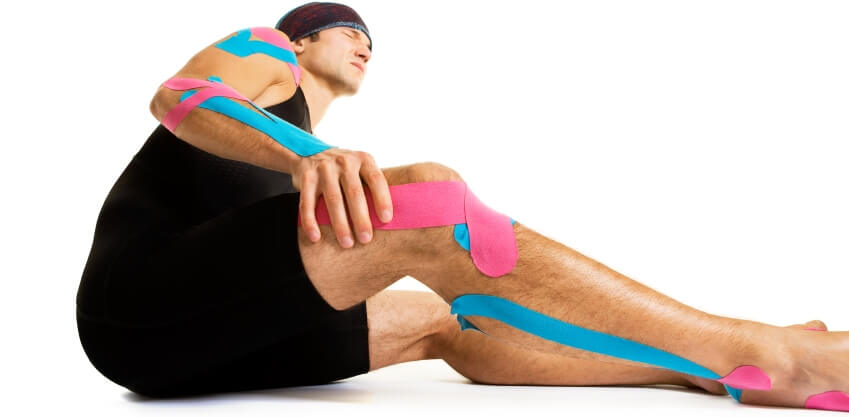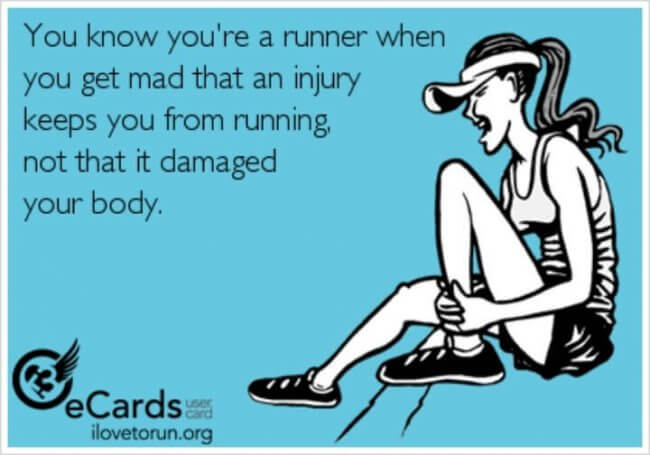The Mental Aspect of Coping With A Running Injury

Avid runners often will tell you that running is not just something they do; rather, it has become part of who they are. When you identify yourself as a runner and hitting the pavement or trail to run becomes as natural and regular as breathing, it can be very difficult to navigate your way through a forced hiatus.
When struggling with injury, many runners end up feeling depressed and frustrated. This frustration can cause the runner to struggle emotionally more than the person would have anticipated. These feelings are far more normal than you might expect.
What Percentage Of Runners Get Injured?
According to Yale Medicine, they estimate that a runner gets some type of injury for every 100 hours they run. Other experts guess that between 65 and 85 percent of runners have suffered from running injury.
Certainly, we all have that running friend who never seems to get hurt no matter what. There is also that person in the group that always seems to be complaining about a sore something or the other. Neither of these people is the norm.
The Two Main Reasons For Sidelining Injuries
There are two main reasons why people do get hurt. The first is due to overuse. What does this mean? Simply put, that you are increasing the volume of your running too quickly, or the pace of your running. Most coaches recommend you only increase your weekly running volume by about 10% per week. In addition, you are cautioned to be cognizant of how much mileage you add to the weekly long run.
If you add on miles (either to the long run, or your total weekly mileage) too quickly, it is common to experience some pain and perhaps actual injury. Your body is a beautiful machine that will do what you ask of it. However, if you ask too much too soon, your body will not respond well.

The second reason is due to structural imbalances, issues with your biomechanics or weakness in a particular muscle or muscle group. A structural imbalance is not something easily corrected. If you have one leg shorter than the other, for example, you might find yourself injured if you run a lot.
Biomechanical problems usually are related to form and you can correct these with time and effort. Working on form is a great way to remedy these problems. Lastly, you can take care of weakness of muscle groups in the weight room and by proper stretching.
What If Running Is Your “Therapy?”
Although this is in no way to insinuate that you should substitute running for real mental health medical attention, but for many runners, running is how they cope with stress and other hardships life throws at us.
If you are reading this article, you are likely aware that running (and other vigorous exercises) causes your body to release norepinephrine. Norepinephrine is a chemical that, among other things, helps your body to react more positively to stress.
The chemicals produced while running, as well as immediately after physical activity, can help relieve anxiety. Running produces endorphins that act like serotonin, a naturally produced hormone that among other things, regulates mood. Scientists have shown that running creates long-standing changes in the brain that bring about overall better well-being.
Running often provides a focus for people struggling with an issue or concern. For some reason, whatever you are struggling with seems more manageable when you tackle it while hitting the open road or trail. That is not to presume the problem is going to go away, simply that you feel a bit more like you can survive it.
So how do people cope if during an injury they find themselves sidelined?
Surviving A Sideline
The first thing you need to remember is that if you actually do rest and do what needs to be done to heal your body, you are far more likely to be sitting out for a shorter period of time. Sometimes it is helpful to offer yourself another focus during injury. If that focus is running related, you may find that helpful!
If you need to sweat and you can still work out (just not running), you might want to try something else. Can you swim? Water walk? Cycle? Do you have access to a rowing machine? If you cannot do anything like that, there are still options! Yoga could help you increase your flexibility and also improve your mindfulness.
You can also use the time to do running-specific stretches! There is also foam rolling that can be done. Often I neglect this task. Not when I am injured!
This might be an excellent time to read some awesome books about running. My personal favorite? Born to Run! Another favorite? First Ladies of Running! Last time I was injured, I found myself reading a lot of amazing books!
You can also stay connected with other athletes to help keep your sanity through a running injury. My favorite running group, the Sub-30 Club, has an Injured Reserved Club (IRC) for just this purpose. People can talk through the crazy as they work through the healing process.
Honestly, don’t be surprised if you find yourself needing to talk to someone about your struggles through injury. It may seem silly… like, I’m just hurt and can’t run? But if running is how you work through your stress, normal stress and struggle may culminate into so much more.
If you’re struggling in a big way, find yourself someone to talk to. Whether this is your bestie or a licensed therapist is up to you.
How Long Should You Rest A Running Injury?
By now, you are probably used to me saying, “that is not a black and white question.” The amount of time you need for recovery is as individual as each person and injury. You may need three days, or three weeks or three months.

The key is to listen to your body. If you are not healing, you need to listen to a specialist or professional. Maybe this is a physician or physical therapist, or it may be your coach. Just listen.
When Can You Run With Injury?
First, you need to know the difference between a twinge and an injury. There is also generalized discomfort we get from hard training, as opposed to the actual hurt from something really wrong with our body.
If you take things nice and easy, warm-up carefully and with precision and you can run easy without irritating the body part that hurts, it may be safe to run. You really do have to proceed slowly and carefully when hurt.
My Journey
About 4 years ago, I was actually quite sick. I had significant stomach issues. Nausea plagued me for weeks. My general practitioner could not figure out what was wrong with me so she sent me to a specialist. The specialist ran thousands of dollars worth of tests and also could not diagnose any problems.
Since I was rapidly losing weight and suffering from terrible nausea, the specialist advised me to stop running immediately. I was not allowed any type of workout. To understand my complete frame of reference, you need to know I am a principal in a rural school and running has been my stress reliever for years. When that was taken away, I spiraled. At the end of it all, I lost about 10% of my body weight which on someone my size was catastrophic.
Eventually, I was back to my GP who sent me to another specialist in a medical hospital. After spending 20 minutes with the nurse practitioner at the medical hospital, she stated that I had made too many changes all at once. She encouraged me to go ahead and resume running. She also pushed me to find a therapist to help me navigate my worry and concern.
“Just take it easy at first,” she advised. “You can’t just take away someone’s outlet without advising them how to stay sane through that journey.” She could not figure or see any rational reason I should not exercise, so she allowed me to start up again.
It was amazing how much working out changed my outlook. It still was a journey to figure out what was wrong with my gastro system, but my disposition improved dramatically.
While my sickness was not a running injury, the impact was similar. Without the outlet I so desperately needed, I was struggling with the weight of life. It took the insight of a proactive medical professional who could see the big picture and chose to treat the whole person to help me improve.
Latest Articles
 Is Running on a Treadmill Easier Than Running Outside?Runners have their own preferences, whether it is treadmill running, running outside on the road, or exploring trails. So...
Is Running on a Treadmill Easier Than Running Outside?Runners have their own preferences, whether it is treadmill running, running outside on the road, or exploring trails. So... Is It OK to Use Trail Running Shoes on the Road?While trail running shoes can be used on roads, especially in situations where a runner encounters mixed terrains or pref...
Is It OK to Use Trail Running Shoes on the Road?While trail running shoes can be used on roads, especially in situations where a runner encounters mixed terrains or pref... How to Fix Sore Quads After Running?Rest, ice, gentle stretching, and over-the-counter pain relievers can help soothe sore quads after running. Also, ensure ...
How to Fix Sore Quads After Running?Rest, ice, gentle stretching, and over-the-counter pain relievers can help soothe sore quads after running. Also, ensure ... 10 Fruits With The Most Electrolytes to Replace Sports DrinksThese fruits are high in electrolytes such as potassium, magnesium, and calcium, essential for hydration, muscle function...
10 Fruits With The Most Electrolytes to Replace Sports DrinksThese fruits are high in electrolytes such as potassium, magnesium, and calcium, essential for hydration, muscle function...

